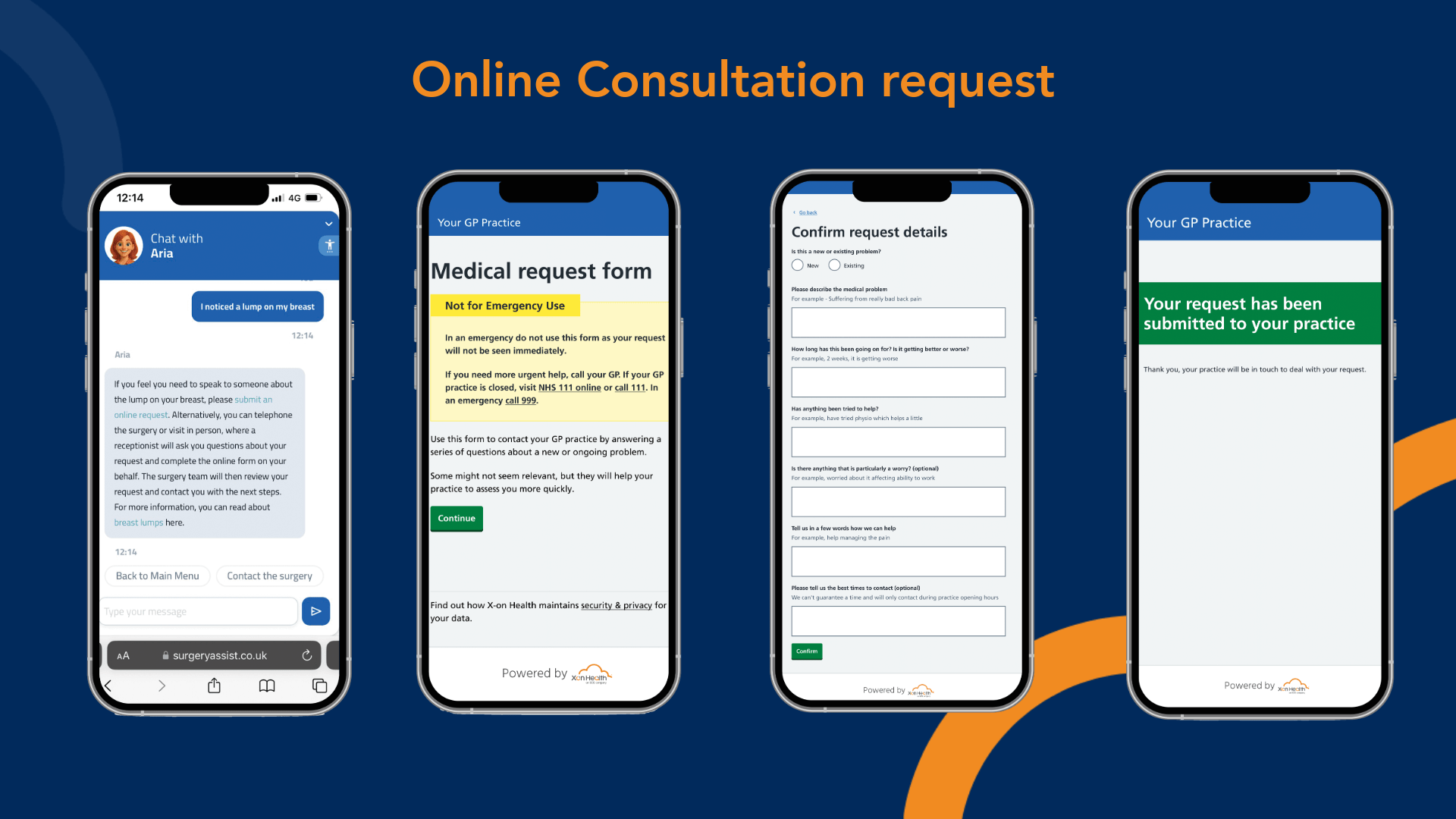The NHS is moving rapidly towards a digital-first model, with the NHS App positioned as the ‘front door’ to healthcare. Against this backdrop and patient dissatisfaction with telephone access, changes to NHS England’s GP contract 25/26 convey new requirements for practices. One of these being that from 1st October 2025, every practice must keep its online consultation (OC) tool open during core hours so 8am–6.30pm, Monday to Friday. The same access is expected to be available across local Primary Care Networks (PCNs).
For practices already under pressure, these changes risk adding new layers of complexity. Simply keeping OC forms open all day can increase workload rather than improve access if the right safeguards and processes aren’t in place. Let’s explore how tools like Surgery Assist are evolving to help practices not just meet changes to the GP contract 25/26, but stay ahead—ensuring compliance, managing demand safely and protecting funding.
What the GP contract 25/26 means for OC tools
The new GP contract requirements place greater emphasis on:
- Online consultation availability – OC tools must remain open throughout core hours, not just when practices are less busy.
- Patient safeguarding – measures must prevent urgent clinical requests from being submitted via online forms, ensuring patient safety is not compromised.
- Transparency – practices must publish a patient charter outlining their OC access arrangements.
These changes present challenges. Without intelligent triage, open OC tools can simply shift workload from phone calls to online forms, increasing admin burden. The key here is to balance compliance with demand management.
Adding OC form capability to intelligent patient navigation ahead of the GP contract 25/26
Surgery Assist, our AI-powered care navigation chatbot, already helps practices manage demand by diverting a significant number of inbound requests before they ever reach the phone queue. Using intelligent care navigation, it can resolve or redirect around 30% of patient queries by signposting to the NHS App or the right service, whether that’s NHS 111, pharmacy, self-help resources, or local services. This reduces pressure on reception teams, shortens waits for patients and ensures clinical time is reserved for those who need it most.
Building on this, Surgery Assist will soon include embedded OC forms to help practices comply with GP contract 25/26 changes while maintaining safe and efficient workflows. Rather than exposing a static web form, Surgery Assist adds a vital layer of protection by triaging requests before surfacing the OC option.
For clinically urgent cases, Surgery Assist will immediately flag this and prompt the patient to book an appointment instead of routing it through a non-urgent online form. When an OC form is appropriate, patients can complete it directly within the chat, with NHS-compliant patient verification and the ability to log whether the request is for a new or existing condition to better support continuity of care (see below for a snapshot of the patient journey). Voice submission will also soon be available for those who prefer or require spoken interaction, supporting equitable patient access through technology.

A snapshot of an example patient journey to an OC request
By incorporating OC form functionality within Surgery Assist, practices gain:
- Safe triage first – patients are signposted to the right service before an OC form is offered.
- Integrated workflows – submissions appear in the Surgery Connect Phonebar (or via the browser NavBar for non-Surgery Connect users), where staff can track, triage and assign requests.
- Multi-channel response – practices can reply via video, SMS, or phone, with all communication mapped to the patient record.
- Clear error handling – incomplete forms are logged and followed up on, reducing safety risks.
- Team visibility – requests can be moved to triage lists, assigned to the right GP, or closed once actioned.
The key here is not to surface this OC form on your website, which could overwhelm admin teams, but instead to add a tool like Surgery Assist that can signpost patients to services better suited to their needs, with an OC form as an option for those who need to see a GP.
Building resilience for practices under the GP contract 25/26
GP contract changes are an annual reality, often adding to practice workload or financial risk if not met. By embedding OC form functionality into Surgery Assist, we’re helping practices not only meet requirements for the GP contract 25/26 but also prepare for future shifts in access and funding models.
With intelligent automation, practices can:
- Reduce admin burden – up to 30% of patient requests can be solved or redirected before reaching staff
- Optimise resources – OC requests can be analysed alongside call data and appointment trends in our centralised dashboard Surgery Insights, helping practices match demand with capacity
- Provide equitable access – patients can choose voice or text, in or out of hours, with the same navigation logic applied
- Avoid unnecessary recruitment costs – instead of hiring additional care navigators to handle OC demand, practices can scale digitally at a fraction of the cost
With hands-on deployment and support, we ensure practices can introduce these changes smoothly, communicate them clearly to patients and demonstrate compliance to commissioners.
Preparing for the future of digital access beyond the GP contract 25/26
NHS England’s 10 Year Health Plan sets a clear direction of travel: shifting care from hospitals into the community, moving from analogue to digital, and focusing on prevention as much as treatment. The NHS App will increasingly act as the single gateway to services, making it vital that practices integrate seamlessly with this future model of access.
Surgery Assist is designed to work across existing systems, creating a single, intelligent front door for patients. Its layered approach helps practices meet the GP contract 25/26 requirements while preparing for the shift towards neighbourhood health services. These changes don’t need to be a source of pressure: Surgery Assist enables safe, efficient OC capability, improving access without overloading staff. Most importantly, it builds long-term resilience, ensuring practices are compliant today and aligned with the digital-first, preventative care model of tomorrow.
At X-on Health, we believe every patient should be able to get the right care, first time — and every practice should be supported to deliver it. Surgery Assist is one of the ways we’re helping to make that future a reality.

